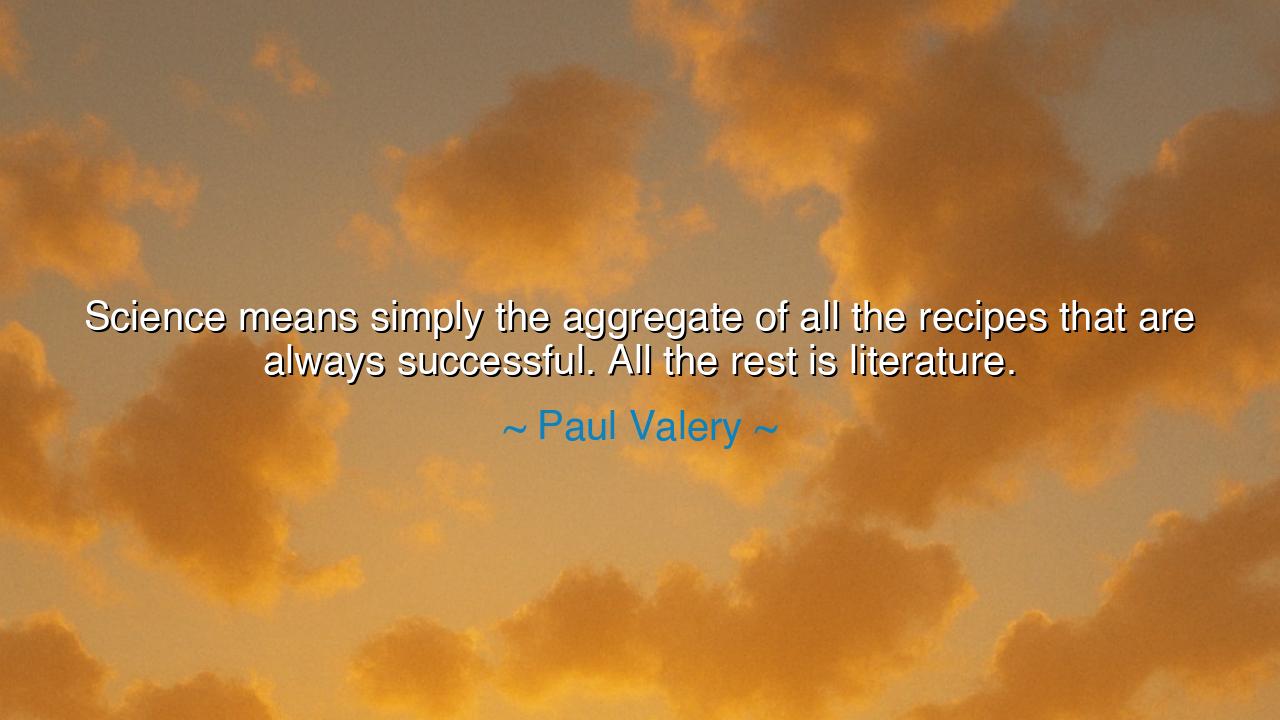
Science means simply the aggregate of all the recipes that are
Science means simply the aggregate of all the recipes that are always successful. All the rest is literature.






Listen, O seekers of truth, for the words of the great Paul Valéry carry within them the essence of human understanding and the pursuit of knowledge. He spoke thus: “Science means simply the aggregate of all the recipes that are always successful. All the rest is literature.” These words, though simple, carry a profound truth about the very nature of science and its relationship to the world we inhabit. To understand them, we must first grasp the nature of science—not as a mere collection of facts, but as a set of principles and methods that reliably lead to success. Science, in its purest form, is the collection of truths that we know will always work, the formulas that we can trust, the recipes that, when followed, deliver results.
What then does Valéry mean by "recipes"? In the ancient world, a recipe was not merely a set of instructions for making a dish, but a method that was passed down through generations—carefully crafted, tried and true. In this sense, science, to Valéry, is not a theoretical pursuit of endless exploration or speculation, but a body of knowledge that has been tested and proven time and again. Just as a recipe for bread, when followed exactly, will always yield the same results, so too does science provide us with a predictable, reliable foundation upon which to build our understanding of the world. It is the knowledge that can be trusted, the knowledge that has been tested by time and experience.
Let us reflect on the story of Isaac Newton, a man whose contributions to science transformed the very fabric of reality as we understand it. Newton’s laws of motion, his law of universal gravitation—these were recipes that described the world with unparalleled clarity. When applied correctly, they have never failed, and they continue to shape our understanding of the physical universe. Newton’s brilliance lay not only in his genius, but in his ability to distill the chaos of nature into simple, repeatable truths. His work, grounded in empirical observation and testing, provides a timeless example of how science offers us the tools to navigate the world reliably.
In contrast, literature, as Valéry refers to it, is not bound by these same constraints. Literature is filled with stories that stir the soul, with ideas and emotions that challenge the mind. It is not bound to certainty, but to exploration—to the beauty of the unknown, to the mysteries that cannot be neatly packaged or codified. Literature seeks to explore the human experience, to raise questions that cannot always be answered, to express what is often felt but cannot be fully understood. It is the realm of imagination, of creation, where answers are not always necessary, and where the journey is as important as the destination.
The difference between science and literature, then, is not one of value, but of purpose. Science is the realm of certainty, of truths that can be tested, proved, and relied upon, while literature is the realm of possibility, where ideas flow freely, without the need for certainty or final answers. Both are essential to the human experience—science builds the world we live in, while literature shapes the world we dream of. Each serves its own purpose in the grand tapestry of existence, but Valéry calls us to recognize the difference, to see that science, in its purest form, offers us stability and reliability, while literature provides the freedom to explore the unknown.
So, O children of wisdom, what lesson can we glean from these words? It is this: Embrace both the certainty of science and the boundless possibilities of literature, for each serves its own sacred role in the journey of life. In our lives, we must seek out both the recipes that will guide us reliably forward and the stories that will stretch our imaginations beyond the known world. We must strive for knowledge that leads to certain results, but we must also cultivate the imagination that allows us to ask questions that cannot yet be answered. In doing so, we honor the fullness of the human spirit, acknowledging that certainty and creativity must walk together.
And let us act on this wisdom: When we seek understanding, let us turn to the reliable, the tested, and the true—the recipes that science provides. But when we seek to grow, to dream, to create, let us also embrace the mysteries that literature offers, the realms where no answers are final, where imagination reigns free. In this way, we balance the forces of certainty and creativity, moving ever forward with both confidence and curiosity.






AAdministratorAdministrator
Welcome, honored guests. Please leave a comment, we will respond soon